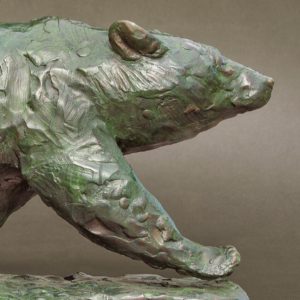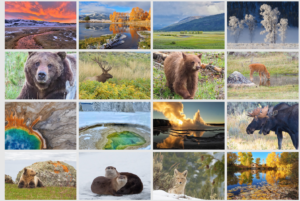Lots of folks have been asking us what happened to wildlife during the recent historic Yellowstone flood. Here is the transcript of the video George recorded on the subject.
[00:00:00] Hey, everybody, it's time for an update. It's been a little bit, the summer solstice has passed. We're now two, three days into summer. So I hope you had a chance to acknowledge and enjoy that. But as you probably know, through the national media, we've had some pretty serious flooding out here. So I'll give you a little update on that.
The Northern loop of the park is open, but not the roads from Mammoth to Gardiner and Tower Falls out to Cooke City . Everybody's still just trying to take stock of what's happened. And it's, it's been interesting to say the least; I had COVID, Jenny had COVID during all of this. We were trying to keep young George healthy, so he could go to Costa Rica [to study sea turtles], which he flew out yesterday and landed yesterday evening.
So that's all good. But one of the topics that we haven't had a lot of coverage of is what the flooding has done to the animals. And I think in most respects, a lot of animals just took it in stride. They see the water coming up, they moved to higher ground. I definitely did hear of a few instances of some cattle being [00:01:00] washed away down in the Paradise Valley.
The neighbor's grandson saw a dead bison floating down the Yellowstone River upstream of Gardiner. A lot of people don't think about the aquatic life that lives in the river. What do they do when these huge boulders are rolling down the drainage?
In fact, one friend thought he woke up to a thunder and lightning storm. He was hearing the thunder the morning of the flood. And actually he was hearing the boulders roll down. So what are the trout and what are all the other fish and aquatic insects and things doing? And the answer is a lot of times they're going up side streams and other tributaries to get out of the heavy flow, which everything was heavy then.
But try to find some refuge there within the, the stream in the river. But it makes it also hard for osprey and eagles and other creatures that are trying to find those fish too, like otters, muskrats, beavers, where are they going when their lodges get washed away? I don't think we have very good data on that, but it certainly upends them in terms of having a dependable home for the near term.
I was helping some friends dig out [00:02:00] their property from all the mud and muck that accumulated, and it was pretty reassuring to see in the two to four inches of silt and clay that had built up on their property from the four feet of water that had washed through their structures and across the land that there were toad tracks and frog tracks and turtle tracks. And I turned over an upturned table to clear off one of their decks. And lo and behold here is a garter snake that was laying underneath it all coatedin a film of mud, probably had been hiding there the entire time.
It was a garter snake and they do spend a lot of time underwater. So a lot of those species did find little refuges to hold onto. Certainly a lot of ground burrowing animals like voles and mice and pocket gophers probably did succumb to the floods if they weren't able to get out in time. Because the waters did come up pretty fast.
On that one particular property I mentioned they did find a dead deer fawn, so some of the wildlife do definitely succumb in these floods, but a lot of the birds were [00:03:00] singing and carrying on as they usually do. If they're ground nesters, of course, they may have lost their nests, potentially chicks, potentially food sources, but a lot of them were carrying on and after the waters went down they seem to be functioning pretty normally.
But that's, that's a little roundup of what some of the animals are doing. I do have a couple instances of elk taking young ones in or near the water, and that's always a dangerous thing. I can't for the life of me, figure out why bison and elk and other species sometimes will take their kids across flooding rivers.
But they do. And a lot of times they actually do manage to survive it in spite of the danger. So at any rate, that's what's been happening here in Yellowstone country. I hope you've been having a safe and happy start to summer yourselves. And thanks for tuning in, have a great day.
Want to keep up with Yellowstone life? Check out our other posts and sign up for our email list here: https://www.ayellowstonelife.com



